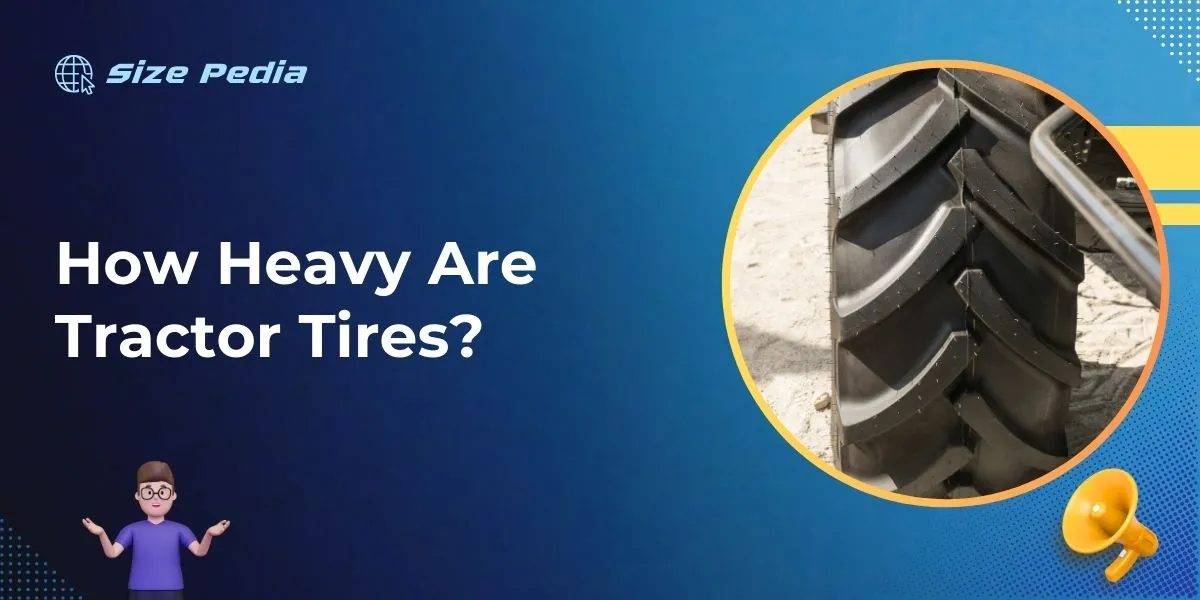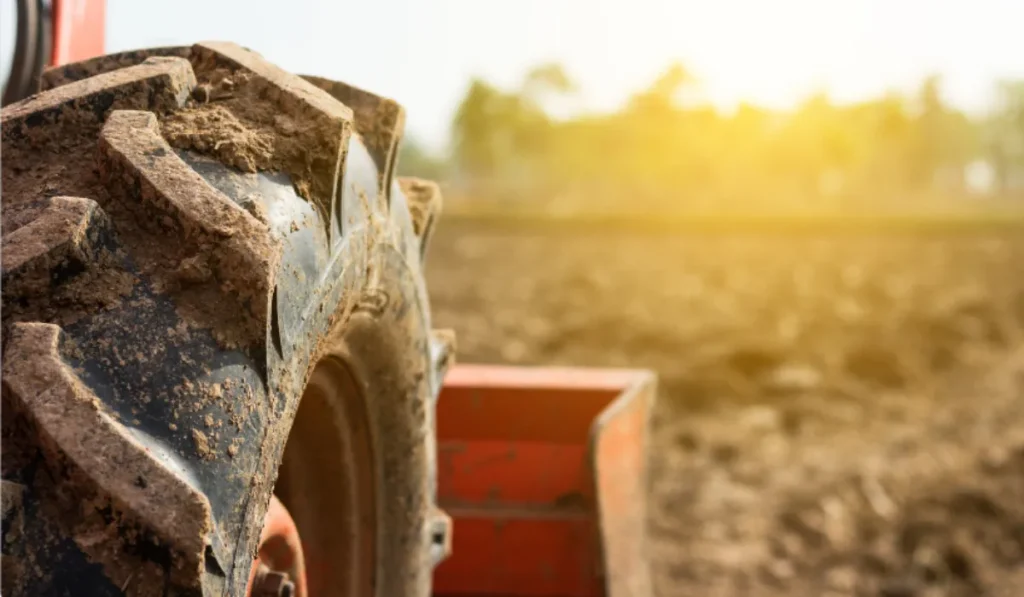Tractor tires can weigh between 400 to 600 pounds each. Larger models may exceed 1000 pounds per tire.
Tractor tires are integral to the operation of any farm, large or small, playing a crucial role in both the efficiency and safety of agricultural tasks.
These heavy-duty tires are designed to provide stability, traction, and durability on a variety of terrain.
They must support the immense weight of the tractor and any additional load it carries while also resisting punctures and wear from rough or uneven ground.
The significant weight of tractor tires contributes to their ability to compact the soil appropriately and maintain the necessary grip to work the land effectively.
Their design and construction utilize sturdy materials and reinforced sidewalls to meet the demanding conditions of farming life.
Choosing the right tractor tire not only influences the performance of the machinery, but also has an impact on the productivity and successful operation of a farm.

Heft Of Agriculture: Tractor Tires
Farmers rely on tractors for many tasks. Tractor tires bear a large part of this responsibility.
Size Matters: Dimensions Of Tractor Tires
The size of tractor tires can greatly vary. Larger models support heavy-duty work.
- Front tires often range from 24 to 34 inches in diameter.
- Rear tires can span up to 50 inches or more.
| Type of Tractor | Front Tire Size (inches) | Rear Tire Size (inches) |
|---|---|---|
| Utility | 24 – 30 | 36 – 48 |
| Row crop | 26 – 34 | 38 – 50 |
What Goes Into The Weight?
Tractor tires are not just big; they are built to last. Special materials add weight.
- Heavy-duty rubber forms the main body.
- Steel and fabric belts reinforce the structure.
- Liquid ballast may be added for extra weight.
These components ensure the tire can support tractor’s weight and work.
Scaling It Up

Tractor tires come in all shapes and sizes. They can weigh as little as a small dog or as much as a car.
Knowing their weight helps understand the power and size of the tractor. This guide looks at different tractor tires and how much they weigh.
Let’s scale up from the smallest garden tractors to the largest industrial machines.
Petite Plots: Weights For Smaller Tractors
Small tractor tires are easy to handle. They are perfect for gardens. These tires usually weigh between 20 and 50 pounds. Here’s a quick look at different kinds:
- Garden Tractors: 20-30 pounds
- Subcompact Tractors: 30-40 pounds
- Compact Tractors: 40-50 pounds
This range allows for easy movement and less soil compacting.
Industrial Giants: The Big Weights
Big tractors need big tires. They carry heavy loads and work hard. These tires can weigh hundreds of pounds.
In fact, some can weigh over 500 pounds each. Let’s see some examples:
| Tractor Type | Tire Weight |
|---|---|
| Utility Tractors | 100-200 pounds |
| Row Crop Tractors | 300-400 pounds |
| 4WD Tractors | Up to 500+ pounds |
These weights help tractors grip the ground and do their job better.
The Purpose Of Heaviness

Farming is tough work. So, tractor tires must be tough too. The weight of tractor tires is not by chance. It’s by design.
Heavy tires support the heavy jobs tractors do. Let’s dive in and understand the reasons behind the heft of these tires.
Traction And Performance
Think about walking on ice. Without good shoes, you slip. Tractors work the same but on dirt and mud. Heavy tires help tractors not slip.
- Grip: More weight means better grip. This is how tractors pull big loads.
- Stability: Heavy tires keep tractors steady. Even when turning or lifting, they stay balanced.
Heavy tires mean work gets done, no matter the soil.
Durability In Demanding Conditions
A tractor’s day is long. The fields are harsh. Tires must last. Weight adds life to tires.
| Weight Benefit | How It Helps |
|---|---|
| Less Wear | Thick, heavy rubber takes longer to wear down. |
| Resist Damage | Heavy tires fight off rocks, roots, and ruts better. |
These tires face hot sun, cold rain, and sharp stubble. But, they keep rolling year after year.
Putting The Pressure Down
The weight of tractor tires is a game-changer in farm productivity. Perfect weight distribution is key for efficient farming.
It changes how the tire pushes against the ground. Let’s dive into how this pressure affects the earth below and the safety above.
Impact On Soil
Tractor tires can be quite heavy. They spread the tractor’s weight
over a large area. Here’s how the weight of these tires affects the soil:
- Less compacted soil means better crop growth.
- Correct weight distribution prevents soil damage.
- Airs and waters soil when the pressure is just right.
Stability For Safe Operations
Safety is paramount. Heavier tires improve stability. See below for the benefits:
- More traction during operations.
- Reduced risk of tipping with even weight spread.
- Better control on slopes for safe maneuvering.
How Farmers Handle The Bulk?
When we consider the might of machinery on the farm, tractor tires stand out. They are behemoths made for the earth. Farmers deal with heavy tires regularly.
The weight of these tires impacts their work in the field. This blog section dives into the world where farmers manage these massive wheels.
Installation And Maintenance
Tractor tire installation and upkeep are vital tasks that require methodical approaches.
- Selection of the right equipment is crucial.
- Regular checks prevent tire issues.
- Proper inflation extends tire life.
- Understanding weight distribution aids in performance.
Farmers make sure to balance practical know-how with technical insights to keep their tractors rolling smoothly.
Safety Precautions For Heavy Lifting
The mass of tractor tires poses risks during lifting and moving.
Here are key safety tips:
- Always use the correct lifting equipment.
- Follow lifting guidelines for your back and knees.
- Keep the area around the tires clear.
- Work with a partner when moving heavy tires.
Implementing these practices ensures safety and efficiency in handling these giants.
Tractor Tires In Other Industries
Tractor tires are giants in the world of wheels, traditionally associated with farming. Their use, however, stretches far beyond the cultivation of fields.
Various industries repurpose these robust wheels, capitalizing on their strength and durability. These tires support an array of heavy-duty tasks across different sectors and terrains.
Off-road Adventures
Tractor tires thrive in off-road conditions. Their deep treads grasp the earth, giving grip in mud and sand. Here’s how thrill-seekers and professionals use them:
- 4×4 Enthusiasts: Custom rigs sport tractor tires for better traction.
- Rescue Vehicles: Reach remote areas with large, sturdy tires.
- Construction Sites: Navigate uneven grounds with ease.
Innovation In Heavy Tire Design
The quest for more versatile and enduring heavy tires is ongoing. Innovators shape the future with designs that promise:
| Features | Benefits |
|---|---|
| Eco-Friendly Materials | Better for the planet |
| Advanced Tread Patterns | Boost performance in diverse terrains |
| Improved Durability |
Extend tire lifespan, reduce costs |
FAQs About the Weight of Tractor Tires
What Is The Average Weight Of A Tractor Tire?
Tractor tires can vary widely in weight. However, on average, large rear tractor tires weigh around 400 to 600 pounds. Smaller front tires may be around 100 to 300 pounds. The weight depends on tire size and type.
Are Heavier Tractor Tires Better For Farming?
Heavier tractor tires provide better traction and stability, which can be beneficial in farming. This advantage aids in efficient plowing, planting, and harvesting by minimizing slippage and soil compaction.
How Does Tire Weight Affect Tractor Performance?
Tire weight impacts traction, fuel efficiency, and soil compaction. Heavier tires offer greater traction, which can enhance performance but may also increase soil compaction. Selecting the optimal tire weight is crucial for balanced performance.
Can I Reduce Tractor Tire Weight?
To reduce tractor tire weight, consider using lighter-weight materials like poly-fill or foam-fill instead of liquid ballast. However, always consult a professional to maintain tire integrity and tractor balance for safety.
Conclusion
Understanding the weight of tractor tires is crucial for those in the agricultural and construction industries. It’s clear that these tires are substantial, ensuring stability and efficiency for heavy-duty tasks. Remember, the exact weight depends on tire size and type.
Proper knowledge enables optimal equipment performance and safety. Choose wisely for your specific needs, and always consider professional advice for the best results.
Resources:
https://www.federalregister.gov/documents/2019/12/19/2019-27209/federal-motor-vehicle-safety-standards-tires
https://www.transportation.gov/tags/tires
